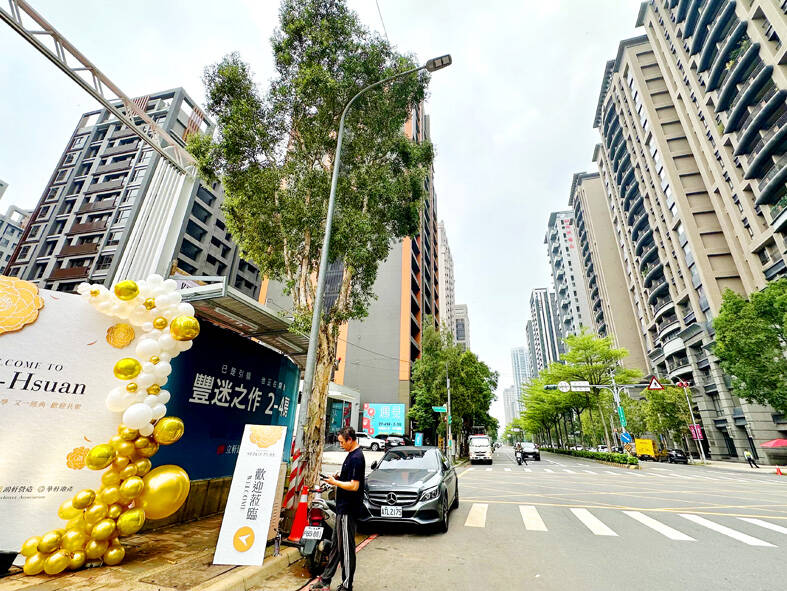Housing transactions in the first six months of this year soared 27 percent from a year earlier to 177,000 units, two separate surveys showed, despite steep price increases in some major urban centers.
Sinyi Realty Inc (信義房屋), Taiwan’s only listed broker, yesterday said that there was an increase in transactions for new and existing houses as buyer interest spiked.
More increases are expected, Sinyi Realty said.

Photo: Hsu Yi-ping, Taipei Times
The upbeat sentiment came even though home prices rose 4.8 to 17 percent in the six special municipalities — Taipei, New Taipei City, Taoyuan, Taichung, Tainan and Kaohsiung — as well as Hsinchu city and county, Sinyi research manager Tseng Ching-der (曾進德) said.
Prices in the Hsinchu area increased the most nationwide with a 17.1 percent jump in the first half, followed by Taoyuan (15.6 percent), Taichung (14.9 percent) and Kaohsiung (13.1 percent), the company said.
Sinyi Realty linked the surge in buying interest to an economic recovery and TAIEX rallies.
Taiwan’s exports expanded more than 10 percent in the first half and would gain pace in the high sales season for technology products, Tseng said.
At the same time, local stocks have repeatedly set new highs amid a global craze for artificial intelligence applications, he said.
Sinyi Realty expects challenges to arise, as the central bank last month raised the lenders’ reserve requirement ratio by 12.5 basis points and lowered the loan-to-value limit from 70 percent to 60 percent for second-home mortgages in the six special municipalities and Hsinchu.
Furthermore, the government and state-run banks have tightened reviews for first-home loan applications to root out dummy buyers and potential landlords, the realtor said.
Interest subsidies and other favorable lending terms are intended to help people buy first homes to meet self-occupancy needs, the Ministry of Finance has said, adding it would take action against those who contravene the rules.
A separate survey last week by Cathay Real Estate Development Co (國泰建設) showed that presale and new house projects in the April-to-June quarter more than doubled to NT$557.5 billion (US$16.97 billion) from three months earlier.
Selling prices averaged NT$530,300 per ping (3.3m2) nationwide, an increase of 6.7 percent from a quarter earlier, Cathay Real Estate Development said, adding that the 30-day sales rate climbed 5.22 percentage points to 22.12 percent.
Taiwan’s rapid economic growth lent support to the upturn in the presale and new housing market by measure of project volume, sales rates and selling prices, it said.
The gauge on price concessions widened 0.31 percentage points to 6.38 percent, still within a healthy range, it said.
Cathay Real Estate Development said that it is optimistic the improvement would continue, but warned that the central bank might introduce more credit controls to rein in the market.

‘SWASTICAR’: Tesla CEO Elon Musk’s close association with Donald Trump has prompted opponents to brand him a ‘Nazi’ and resulted in a dramatic drop in sales Demonstrators descended on Tesla Inc dealerships across the US, and in Europe and Canada on Saturday to protest company chief Elon Musk, who has amassed extraordinary power as a top adviser to US President Donald Trump. Waving signs with messages such as “Musk is stealing our money” and “Reclaim our country,” the protests largely took place peacefully following fiery episodes of vandalism on Tesla vehicles, dealerships and other facilities in recent weeks that US officials have denounced as terrorism. Hundreds rallied on Saturday outside the Tesla dealership in Manhattan. Some blasted Musk, the world’s richest man, while others demanded the shuttering of his

ADVERSARIES: The new list includes 11 entities in China and one in Taiwan, which is a local branch of Chinese cloud computing firm Inspur Group The US added dozens of entities to a trade blacklist on Tuesday, the US Department of Commerce said, in part to disrupt Beijing’s artificial intelligence (AI) and advanced computing capabilities. The action affects 80 entities from countries including China, the United Arab Emirates and Iran, with the commerce department citing their “activities contrary to US national security and foreign policy.” Those added to the “entity list” are restricted from obtaining US items and technologies without government authorization. “We will not allow adversaries to exploit American technology to bolster their own militaries and threaten American lives,” US Secretary of Commerce Howard Lutnick said. The entities

Minister of Finance Chuang Tsui-yun (莊翠雲) yesterday told lawmakers that she “would not speculate,” but a “response plan” has been prepared in case Taiwan is targeted by US President Donald Trump’s reciprocal tariffs, which are to be announced on Wednesday next week. The Trump administration, including US Secretary of the Treasury Scott Bessent, has said that much of the proposed reciprocal tariffs would focus on the 15 countries that have the highest trade surpluses with the US. Bessent has referred to those countries as the “dirty 15,” but has not named them. Last year, Taiwan’s US$73.9 billion trade surplus with the US

Prices of gasoline and diesel products at domestic gas stations are to fall NT$0.2 and NT$0.1 per liter respectively this week, even though international crude oil prices rose last week, CPC Corp, Taiwan (台灣中油) and Formosa Petrochemical Corp (台塑石化) said yesterday. International crude oil prices continued rising last week, as the US Energy Information Administration reported a larger-than-expected drop in US commercial crude oil inventories, CPC said in a statement. Based on the company’s floating oil price formula, the cost of crude oil rose 2.38 percent last week from a week earlier, it said. News that US President Donald Trump plans a “secondary